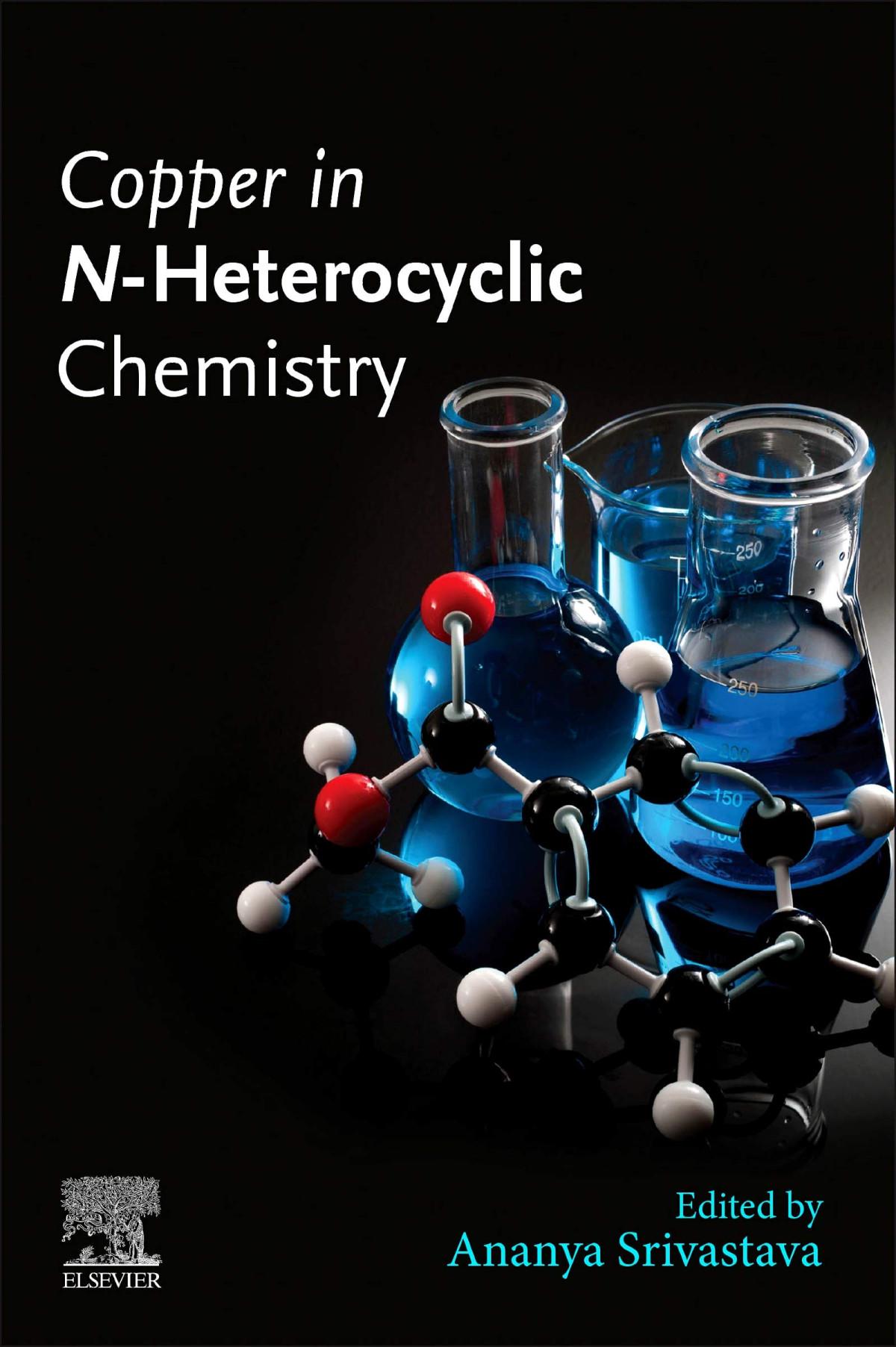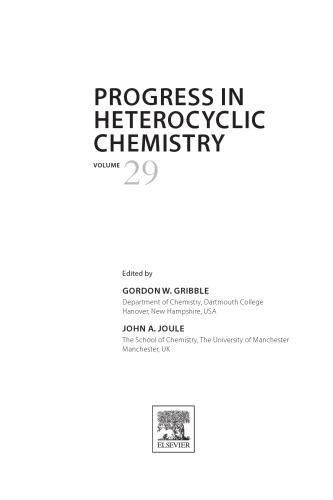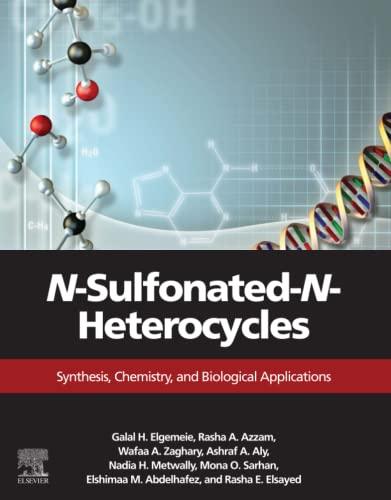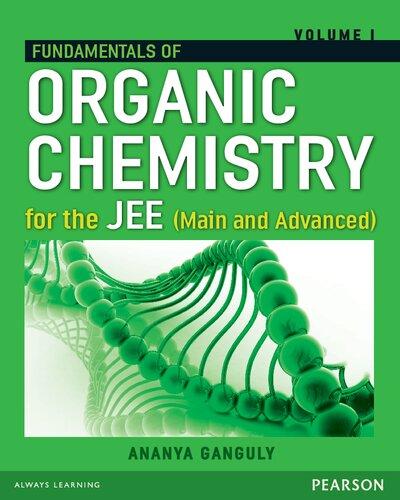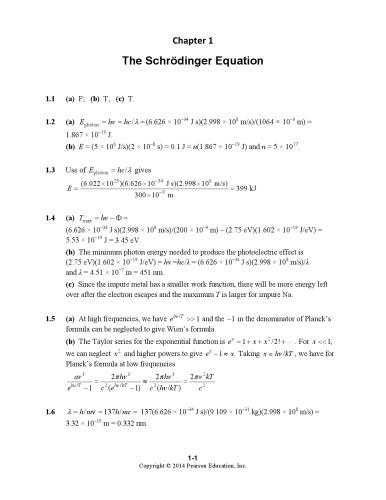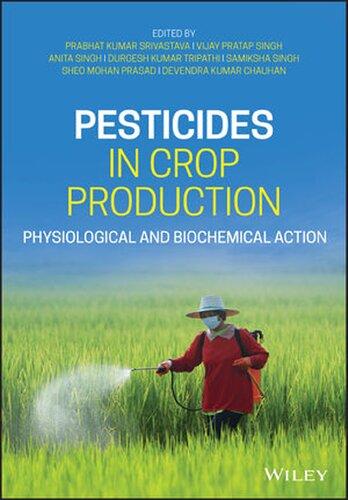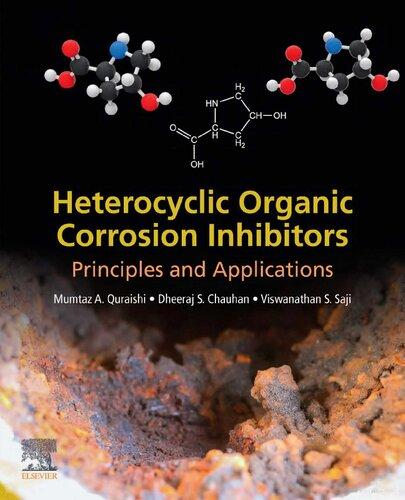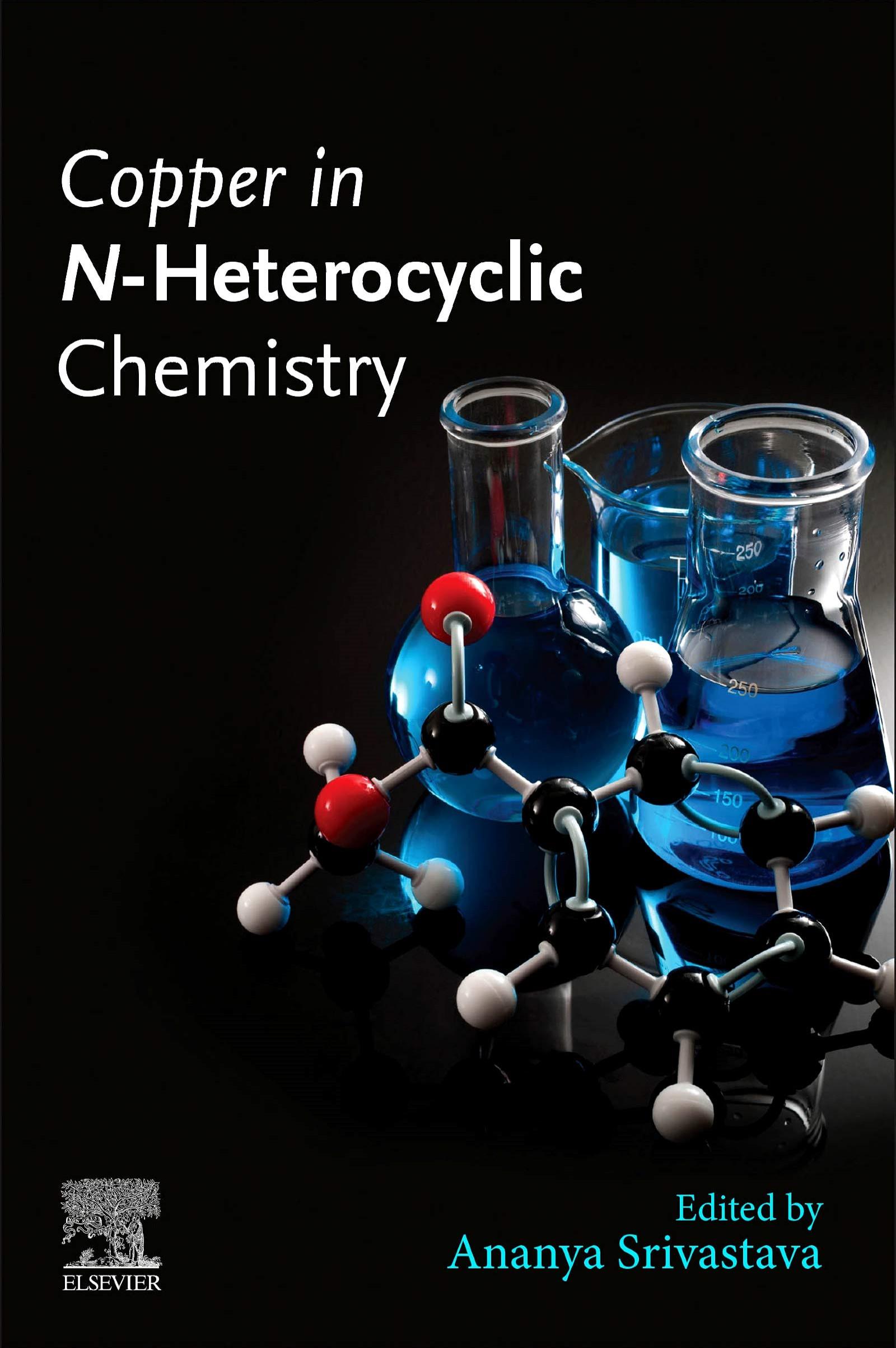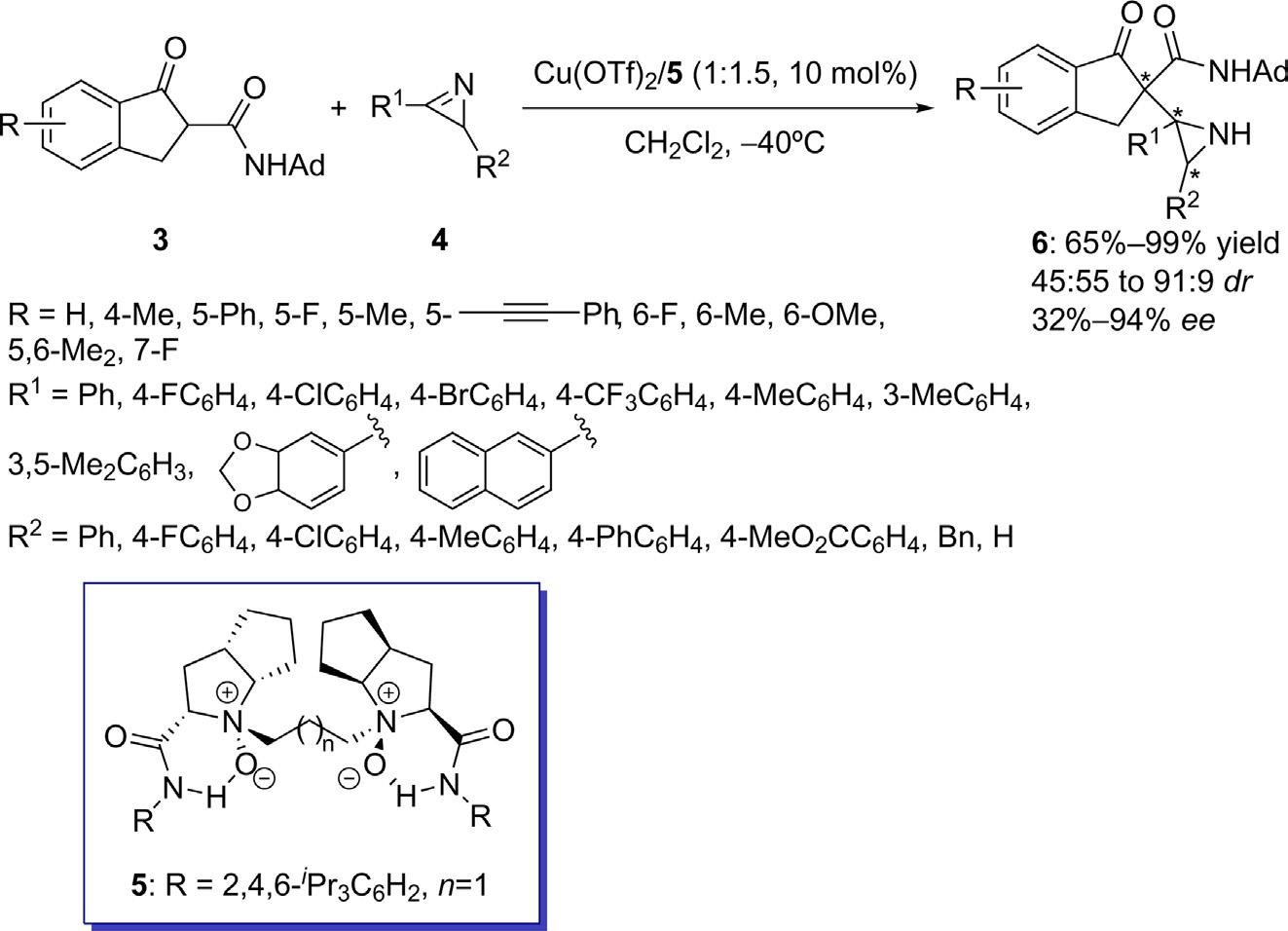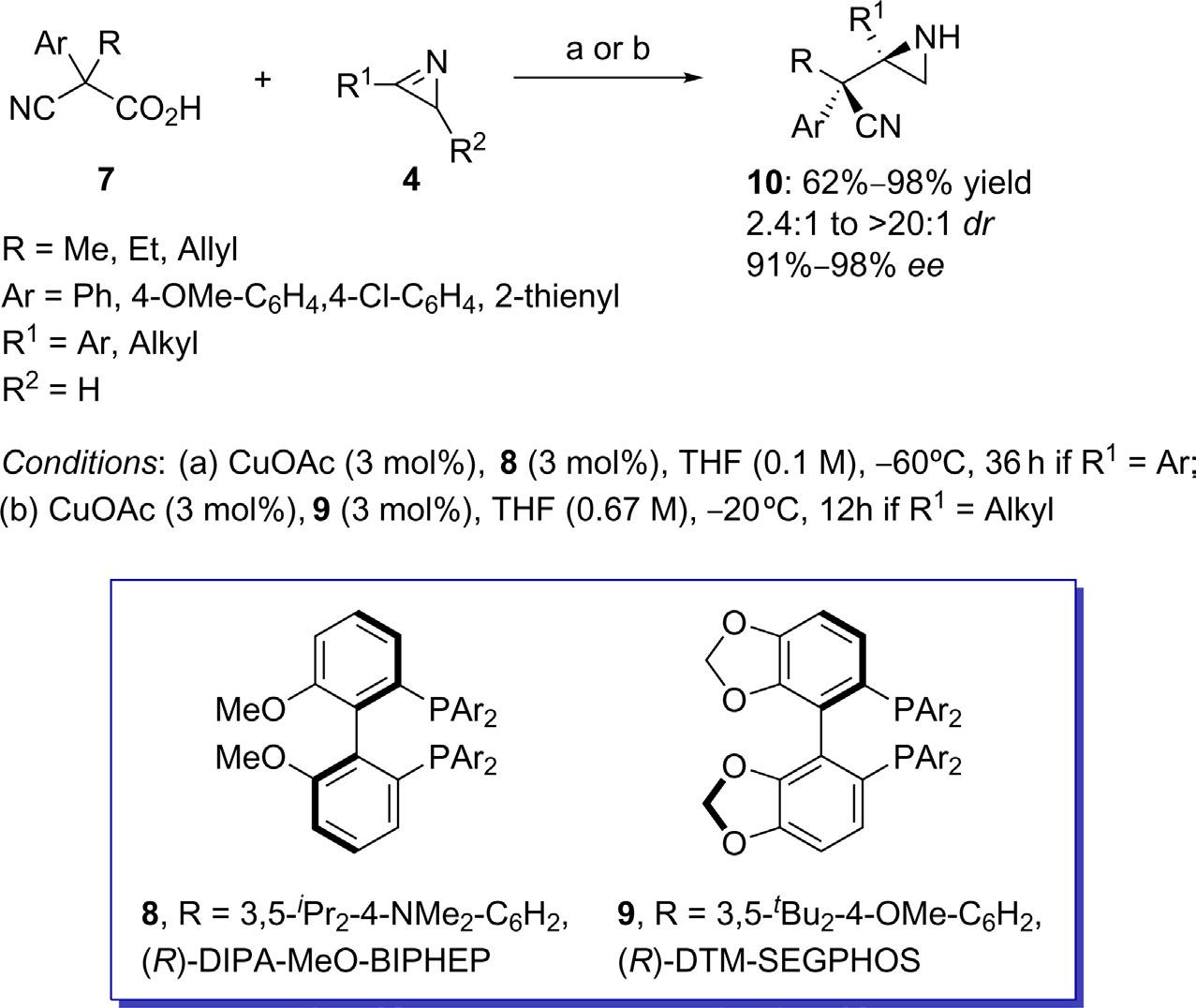Contributors
Ming Bao
State Key Laboratory of Fine Chemicals, Dalian University of Technology, Dalian; School of Petroleum and Chemical Engineering, Dalian University of Technology, Panjin, People’s Republic of China
I.P. Beletskaya
Department of Chemistry, Lomonosov Moscow State University, Moscow, Russia
Ainka T. Brown
Department of Chemistry, The University of the West Indies, Mona, Kingston, Jamaica
Oleg N. Chupakhin
Ural Federal University, Department of Organic and Biomolecular Chemistry, Yekaterinburg, Russian Federation
Nadale K. Downer-Riley
Department of Chemistry, The University of the West Indies, Mona, Kingston, Jamaica
Carlos A. Echeverry-Gonzalez
Organic and Biomolecular Chemistry Laboratory, CMN, Guatiguara Technology Park, Industrial University of Santander, Bucaramanga, Colombia
Ramil F. Fatykhov
Ural Federal University, Department of Organic and Biomolecular Chemistry, Yekaterinburg, Russian Federation
Parthasarathy Gandeepan
Department of Chemistry, Indian Institute of Technology Tirupati, Tirupati, Andhra Pradesh, India
Pranab Ghosh
Department of Chemistry, University of North Bengal, Darjeeling, West Bengal, India
Raoni Schroeder B. Gonçalves
Universidade Federal do Rio de Janeiro, Biocatalysis and Organic Synthesis Group, Centro de Tecnologia, Ilha do Fundão, Rio de Janeiro, Brazil
Muthu Karuppasamy
Department of Chemistry, School of Chemical and Biotechnology, SASTRA Deemed University, Thanjavur, Tamil Nadu, India
Igor A. Khalymbadzha
Ural Federal University, Department of Organic and Biomolecular Chemistry, Yekaterinburg, Russian Federation
Vladimir V. Kouznetsov
Organic and Biomolecular Chemistry Laboratory, CMN, Guatiguara Technology Park, Industrial University of Santander, Bucaramanga, Colombia
Jesús M. de los Santos
Organic Chemistry I Department, Faculty of Pharmacy, Lacaray Research Center, University of the Basque Country (UPV/EHU),Vitoria, Spain
Leandro Soter de Mariz e Miranda
Universidade Federal do Rio de Janeiro, Biocatalysis and Organic Synthesis Group, Centro de Tecnologia, Ilha do Fundão, Rio de Janeiro, Brazil
Nurettin Menges
Pharmaceutical Chemistry Section,Van Yüzüncü Yil University; SAFF Chemical Reagent Research Laboratory,VAN-TEKNOKENT,Van, Turkey
Bijeta Mitra
Department of Chemistry, University of North Bengal, Siliguri, Darjeeling, West Bengal, India
A.Yu. Mitrofanov
Department of Chemistry, Lomonosov Moscow State University, Moscow, Russia
Ana M. Ochoa de Retana
Organic Chemistry I Department, Faculty of Pharmacy, Lacaray Research Center, University of the Basque Country (UPV/EHU),Vitoria, Spain
Francisco Palacios
Organic Chemistry I Department, Faculty of Pharmacy, Lacaray Research Center, University of the Basque Country (UPV/EHU),Vitoria, Spain
Gyan Chandra Pariyar
Department of Food Technology, University of North Bengal, Darjeeling, West Bengal, India
Vladimir L. Rusinov
Ural Federal University, Department of Organic and Biomolecular Chemistry, Yekaterinburg, Russian Federation
Vellaisamy Sridharan
Department of Chemistry and Chemical Sciences, Central University of Jammu, Jammu, Jammu and Kashmir, India
B.S. Vachan
Department of Chemistry, School of Chemical and Biotechnology, SASTRA Deemed University, Thanjavur, Tamil Nadu, India
Zhilong Xie
State Key Laboratory of Fine Chemicals, Dalian University of Technology, Dalian, People’s Republic of China
Yoshihiko Yamamoto
Department of Basic Medicinal Sciences, Graduate School of Pharmaceutical Sciences, Nagoya University, Nagoya, Japan
Sheng Zhang
State Key Laboratory of Fine Chemicals, Dalian University of Technology, Dalian, People’s Republic of China
About the editor
Ananya Srivastava has a PhD in synthetic organic chemistry from the Department of Chemistry, Indian Institute of Technology Delhi, India. Prior to this, she earned her master of science in chemistry securing the highest rank (gold medalist) from D.D.U. Gorakhpur University, Gorakhpur, India. She has also completed the Patent Law course from the Nalsar University of Law, Hyderabad, India. She has worked as a scientific officer and visiting faculty at the National Institute of Pharmaceutical Education and Research, Guwahati (Government of India), India. Her research contributions are interdisciplinary, spanning a wide range in synthetic organic chemistry, nanocatalysis, material characterization, and nanobiosensors. She has published her research work in the leading and representative journals of her research area. She has recently published a book titled Heterocycles via Cross Dehydrogenative Coupling: Synthesis and Functionalization with Springer Nature. She has also presented her research work in various conferences and symposia, including the 2nd International Symposium on C H Bond Activation, Rennes, France. She is the recipient of many prestigious awards and fellowships, including JRF and SRF from Council of Scientific & Industrial Research (CSIR), Government of India, and has been an invited visiting scholar under a National Research Foundation (NRF) of South Korea fellowship to work at Pusan National University, South Korea. She has also worked as a visiting scientist with Professor Yoon Bo Shim at the Department of Chemistry, Pusan National University, South Korea. She is editor of the US journal Modern Chemistry & Applications. Her current research interest lies in chemical education and in developing various courses for undergraduate and postgraduate students.
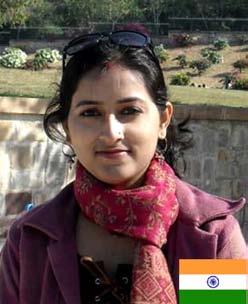
Preface
N-Heterocyclic compounds are important motifs in natural products and pharmaceuticals and are currently receiving a great deal of attention, focused largely on their novel synthesis, from both academic and industrial researchers. This book provides an overview of copper-catalyzed synthesis and functionalization of N-heterocycles. The chemistry of copper is rich in mechanistic possibilities. Copper-facilitated reactions have a long history in organometallic chemistry and new reactions continue to be discovered and developed. In recent years, the area of N-heterocycle synthesis has especially benefited from novel copper-facilitated transformations.
N-Heterocycles are of paramount importance in the pharmaceutical industry and copper chemistry is one of the novel and most efficient methods for making heterocycles.The number of applications of copper chemistry in the syntheses of N-heterocycles has grown exponentially.These developments highlight the need for a monograph dedicated solely to copper chemistry in heterocycles, and this book provides a comprehensive explanation of the subject.The principal aim of the book is to highlight important copper-mediated reactions of N-heterocycles, with emphasis on the unique characteristics of individual heterocycles.
This book contains 13 chapters that exclusively focus on advances in synthetic methodologies for various N-heterocycles. The chapters cover a wide range of N-heterocycles, from small 3-membered to large ring compounds. For a deeper understanding of the synthetic schemes, different mechanistic pathways of the reactions are also discussed. As an effort towards green chemistry, a detailed account of solid supported copper catalysts for N-heterocycles is given in this book, as this topic has attracted much attention in both academic and industrial research. All the chapters have been contributed by experts in this field, and the writing is very simple and informative, so should prove helpful to students of synthesis.
Written for an audience of undergraduate, postgraduate level, and research students, this work is also of interest to all chemists involved in the reactions of N-heterocycles and those investigating copper-facilitated reactions, as well as those who simply wish to stay abreast of a dynamic and fast-growing research field in organic synthesis. I hope this book will shed light on new perspectives and inspire chemists to work towards further improvements and expansion of the applications of copper-catalyzed reactions of N-heterocycles. I also hope it will spur more interest and inspire new ideas in an extremely useful area.
I wish to extend my deep appreciation to all the authors who have contributed to this book and made this project possible. I also thank my family for giving me the time, space, and freedom required to complete such an enormous project.
Ananya Srivastava
National Institute of Pharmaceutical Education and Research, Guwahati, Assam, India
CHAPTER 1
XLIX
THE days that followed were dark and difficult for Mame. Nor did Lady Violet find them particularly easy. At heart she was kindly and honest and she could not help fixing upon herself a good deal of the blame for what had occurred. She it was who had introduced this little marauder; she had been wilfully and stupidly blind to the consequences; and her only excuse was that not for a moment could she believe that Bill would be so weak. Yet she had deliberately thrown them together. She had bestowed upon Mame a spurious eligibility. This bitterly humiliating business was an object lesson in the sheer folly of playing the fool.
It was decidedly painful all round. First of all, poor Mame really suffered. The part she had undertaken to play was superhumanly big. Very few girls could have gone back in that way on their whole philosophy of life; and to Violet’s good heart it was hateful to have to ask her to do it. She must have loved Bill, perhaps as no other woman was likely to do, to nerve herself to a sacrifice so high.
Much diplomacy was called for in the days that followed. Bill could be a stubborn fellow. His family had always humoured his whims. It looked at first as if there would be no handling him. Irresponsible, not to say flabby, as his nature was, had he had the wit to realise clearly that poor Mame had got a blow over the heart, he would not have taken the thing lying down.
Violet, hating intensely the rôle her own folly had doomed her to play, yet proved herself, when fairly put to it, a consummate tactician. Bill must not guess, must not come near guessing, how much this good and brave child really cared for him. He must be rather a “dud,” his sister thought, not to see it for himself. Instinct ought to have told him how the little brick was steeling her heart. Even while Violet threw dust in his eyes with a subtlety and a
success for which she loathed herself, she yet clung to the paradoxical view that had Bill been worthy of Mame he would have been less obtuse. “She can’t bear your losing the Towers and giving up the Army.” That phrase was Violet’s strongest weapon. It admitted two interpretations and his sister was not in the least proud of Bill when he allowed it to suggest the wrong one. “Of course she considers the gilt will be off the gingerbread.” That was Machiavellian. The end seemed to justify the means; at any rate Violet had so persuaded herself; but it really was rather low down. And she could not, womanlike, help resenting Bill’s denseness and lack of character which made the unpleasant task of throwing dust in his eyes so much less difficult than it ought to have been.
The weeks went by and Mame set herself stoically to forget. There was pride in her as well as grit. She was determined to stand up to life and make something of the mighty difficult business of living it. To stanch her wounds she threw herself into her work with new ardour. Back of everything was rare common sense. She must have the strength to bear the self-inflicted blow without flinching.
One morning, however, just before Christmas, an incident occurred that reopened the closing wounds. Mame and Celimene were discussing the make-up of the weekly cable to New York, when Celimene said with an odd change of tone, “There’s one bit of news that may not be without interest on the other side. It’s not yet announced, so we shall be the first in the field.”
“What is the news?” asked Mame keenly. Her flair for a choice tit-bit was not less than of yore.
“A marriage has been arranged, the date of which will be shortly announced, between the Marquis of Kidderminster and Gwendolen, the only child of Giles Childwick, Esquire, and Mrs. Childwick, formerly of Treville, New Jersey.”
“Oh!” Mame gave a little gasp. Celimene saw her turn very white. “We are none of us worthy of you, my dear. In the end you’ll find yourself well rid of people like us.” Violet’s tone had a note of pain
that for her was something new. Life had not been exactly a bed of roses lately. She had discovered, a little late in the day perhaps, that she had a conscience. A share of the hurt she was inflicting had to be borne by herself.
When Mame was able to speak she said: “You’d have been good enough for me. I like you all. You are some of the nicest folks I’ve met.” The whimsical frankness of this good child brought back the laugh, if not too readily, to the worldly wise Violet. What a piece of luck, they both had a sense of humour!
“We owe you more than perhaps you realise.” Violet did not find the words easy, but they had to be said. “You showed how terribly dangerous was delay as far as that brother of mine is concerned. He might have been snapped up by some pretty little prowler, with a nice taste in dicky birds, who short of death and destruction could never have been persuaded to unclasp her claws.”
“That’s so,” assented Mame. “And you’re wise to have hustled on that marriage.” And then whimsically, to ease the aching of her heart: “Some other little cat might have got that bird.”
She was so real and so true, this brave child, that Violet felt she would like to have taken her in her arms and hugged her. “My mother and I both realise that you have done a big thing. She has sent you all sorts of kind messages. We are going to see that Gwendolen plays the game so far as you are concerned. And no matter how long you stay over here you will always have friends.”
“Gwendolen will make him a good wife.”
“Yes, she will. She is a very sensible girl, with a strong will. I am sure she will keep him on the rails. And she really cares for him.”
“Perhaps he’ll get to care for her after a while.”
“I think he may. Gwendolen is a very good sort. But I’m afraid Bill’s feelings don’t run deep.” And the note of pain crept again into the voice of his sister.
LTHE marriage ceremony was fixed for the second week of the new year. All London was invited. The Childwicks liked to do things well, and however well they did them made no impact on their wealth. They were really rich people and of late years their stock had been going continually up.
Still it was generally felt that Gwendolen had done very well. She was a cut and polished jewel, but a setting was needed for her. What choicer setting could mortal girl desire than an old and distinguished marquisate and that beautiful and historical place Warlington Towers? These things would supply the essential background her millions lacked. Then, too, Bill was a popular young man. His feelings, as his sister said, might not run deep, but in his way he was immensely attractive. Everybody liked Bill. Even his fecklessness was a point in his favour. And he would be all the better for having a shrewd and clever American wife to keep him up to the mark.
Mame received an invitation from the Childwicks; her friends saw to that. It was duly accepted; yet when the day came she did not feel equal to facing the music. Lady Violet did her best to persuade her to come to the church and to the reception in Berkeley Square, until she realised that it would not be kind to persist. Good, brave little puss! Those quaint furry paws had been rather nastily trapped. She was still suffering. For all her wonderful grit, when the day came she could not help groaning a bit over the throbbing of her wounds.
It went to Lady Violet’s heart to leave her behind. But there was no help for it. The child could not face the music. And it was hardly reasonable to expect that she should.
Even as Lady Violet stood in her regalia, which emphasised her fine points, and took a tender and affectionate leave of poor Mame, she could not help saying in her frank way: “I’m not going to enjoy this one bit. We’re shown up too badly. I wish now I hadn’t interfered.”
It was no more than the truth. She felt on a low plane. Compared with her friend and business partner she had a sense of inferiority which was new and decidedly unwelcome.
“You were quite right, honey.” Mame was brave and magnanimous to the end. “Had I been you I’d just have done that. It’s nature. And it’s no use trying to go against nature.”
But Mame’s eyes were so tragic, that her friend, without venturing to say another word, made a sort of bolt for the door and for the lift beyond it. No, Lady Violet did not feel that she was going to enjoy her day.
The day, for Mame, was very far from being one of enjoyment either. A great deal of it was spent walking about London. Now the pinch had really come it was the go-getter who mounted to the saddle and took command. The practical side of a dual nature was not slow to inform her that she had gone back on herself. She had betrayed, at the beck of a mere whim, all that she had stood for.
Life had always been against her until a few months ago. She had had to fight so hard for bare existence that she might at least have had the sense to ensure the future when opportunity arose. But no, she had denied her luck. There was a Tide. Well, the Tide had come and she had deliberately ignored it. A great position, social security had been offered her. She had even accepted her chance and then, just for a whim, had passed it on to her enemy and rival.
The go-getter spared her nothing. It had a royal time. She had been a fool. The lot of the fool was suffering. “You’ve broken a paw, honey. Always you’ll be a little mucker now. You’ll never be able to fix on anything again. No more will you be able to mark down your bird and fly at it. You’ll be unsettled for the rest of your days. Not always will you be brisk and quick; your looks, such as they are, and
they’ve never been much to bank on, honey, are going already. These folks in London, England, who mocked at you and pulled your leg, you could have handed them a haymaker. But no, you must get fanciful and highfalutin.”
Yes, the go-getter with the sardonic voice and a flow of rather second-rate conversation had a royal time. He spared her nothing. She was unworthy of herself, of her breed, of her clan. Idealism. The hearty fellow landed his simp of a partner a blow on the point. If some of these honest-to-God Americans didn’t watch out, Idealism was going to be their ruin. You didn’t catch the dyed-in-the-wool Britisher playing around with flams of that kind. He was a pretty successful merchant, the Britisher, but he was content to leave idealism to other people. As a business man he was a model for the world. And why? Because with all his lip service he knew how to keep the soft stuff apart from the hard.
Poor Mame! She trudged half the day about the streets of a hostile city. With that pressure upon her spirit it was impossible to stay quiet indoors. Her very soul seemed to ache. Every syllable was true that was whispered in her overwrought ear. She had gone back on all she had ever stood for. They had put one over on her, these hardroed Britishers. Yes, she must be cuckoo. You came over to pull big stuff, whispered the relentless voice. And by cripes, Mame Durrance, you’ve pulled it!
Tired out at last with tramping the West End parks and squares, she took a little food in a restaurant in a by-street of Soho. There she was likely to meet no one she knew. She was not in a mood to face her kind. As she ate her soup a nostalgia came upon her. After all, she was in a strange land, an alien. Their ways were not her ways; they had a different viewpoint; their method of doing things was not the same. She began to long for the sight and the sound of the homely, hearty, warm-blooded folks she had known; the folks who spoke the same language as herself, in the curious drawl that lately she had been taking such pains to get rid of.
Her thoughts went back to the land where she belonged. In the bitterest hour she had known since she had started out from her home town to see life, she had a craving for the friendly easygoingness of her own kind. She had crowded a lot of experience into her European pilgrimage; in certain ways her luck had been truly remarkable. Mame Durrance had made good at her job; but this evening with a very large size “black monkey” upon her, she had a sudden yearning for the larger and freer air of her native continent.
Miserably unhappy she returned to the flat about nine o’clock. Lady Violet had been home from the revels, had inquired for her anxiously, but had changed her dress and gone out to dinner. Evidently she was making a day of it. Mame was not sorry. She had no wish to be caught in this mood. Yet she had no desire for bed. She would not be able to sleep if she turned in. The ache in her heart was terrible. If she could not learn to subdue it, for the first time in her life she would be driven to take a drug.
Suddenly her eye lit on a package on the writing table. It bore the label of a New York publisher and was addressed to herself. Perfunctorily she tore off the wrapper. A novel in a gay jacket was revealed. It was called PrairieCity; and the name of the author was Elmer Pell Dobree.
Mame’s heart leaped. Coincidence has an arm notoriously long, but nothing could have been more timely than the arrival of this book. Her thoughts rushed back to the source of its being. And as if to speed them on their way, a letter had been enclosed in the parcel.
Characteristically it ran:
DEAR MAME,
You are such a girl now, among your slick friends in London, and you are pulling such big stuff with your weekly columnising, that I daresay you have forgotten your obscure Cowbarn epoch, and the junk whose early chapters you had the honour (sic) of typing for your first and most distinguished (sic) editor, with which the boob
filled in his spare hours. You used to tell him how good these opening chapters were and the boob used to believe you. The consequence is ... well, this is the consequence. By the way, it was clever you that invented the title, after we had shaken a leg—and you were always some dancer —at that dive at the top of Second Street, one wet afternoon.
Well, Mame, that title was lucky. Prairie City has made good. It has, if I may say it modestly, made quite surprisingly good. ’Tis hardly six weeks since it was first issued here by Allardyce, Inc., but already it’s gone big. Early next month their London house will publish it, and if it can repeat in England what it has done in New York, the undersigned Elmer Pell Dobree is a permanent whale. So go to it, Mame, you little go-getter. Corral the big drum and get around the comic town of your adoption—worse luck!—and see if for the sake of old times—good times they were, too, I’ll tell the world—you can’t put one over, in the name of an old friend, on the doggone Britisher.
P.S. When do we see you again here? As I’ve told you more than once, this continent is a poorer place for your absence. If you’ve left us for keeps it’s a great, great shame; and there’s one young man who won’t forgive you.
When, at a decidedly late hour, or, rather, an early one, Lady Violet returned from the festivities, she invaded Mame’s bedroom. She wanted to see if the child had come back and that she was all right. In spite of the excitements of the day her thoughts had been pretty constantly with her little friend. She was a good deal concerned about Mame. And now it was something of a relief to find her propped up in bed, simply devouring a book with a red cover.
It was so good to see a smile on a countenance which a few hours ago looked as if it would never smile again, that the intruder exclaimed, “Why, why, whatever have you there?”
“Elmer’s written a book.” A glow of excitement was in Mame’s tone and in her eyes. “It’s all about Cowbarn and the folks we used to know.”
“True to life, I hope.” Mame’s friend, gazing at her furtively, sought to read what lay behind that rather hectic air.
“Better than life ever was or ever will be. It just gets you feeling good. And it keeps you feeling good all the time.”
“He must be a clever man, your friend Elmer P.”
“Clever is not the name for Elmer.” Mame spoke excitedly. “A genius —that baby! All the Cowbarn folks are in it. I’m in it. And I’ll say he’s let me down light.”
“I hope he’s made you the heroine of the piece. Anyhow, he ought to have. You are fit to be the heroine of the best piece ever written.”
“Say now, honey,” expostulated Mame in the way her friend had learned to love, “that’s where you get off. Heroine-ism and that fancy jake is no use to me. I’ll never be able to get away with it. But Elmer has let me down light.”
“You must let me read it.”
Mame laughed. She actually laughed. “Why, you shall so. It’s the goods. That boy has an eye to him. He can see into things. And he knows a lot about human nature, does that boy.”
Already Lady Violet was feeling a lively sense of gratitude towards the famous and legendary Elmer P. The poor child was transformed. Her own people, for whose homely and abounding kindliness she had in her misery been longing, were alive in those magic pages. Yes, they were alive and they were dancing, Mame declared. And half America was dancing with them.
The mirth of the simple creatures she loved so well had lifted a weight from her heart. The relief might only be temporary, but Lady Violet was very willing to do homage to the wizardry of Elmer P.
“There’s his letter.” Mame tossed it excitedly across the bright green expanse of counterpane.
Lady Violet read with a smile. And then suddenly there came a mischievous little clutch at her heart. Yes, why not? It was an idea. The brilliantly clever woman of the world again glanced furtively at Mame. This intoxicating moment, which was doing so much to heal the child and to keep her sane, must, if possible, be held. But how? Like all things in time it was fleeting, transitory. With the coming of daylight it would surely pass. A pitiless January dawn would throw her back upon hard and cruel reality. Yet this moment of happiness might be extended; perhaps there was a chance of making it permanent.
She fixed her wise eyes upon those of the feverish Mame. “Yes, my dear, we’ll go round with the big drum. We’ll corral the Press all right. If Prairie City doesn’t knock London endways it shall not be our fault.”
“You can bet your life it won’t be!”
“Well, write to-morrow and tell him so.”
“I will.”
“And tell him, my dear, in a postscript, strongly underlined, that if he will do the one thing you ask you’ll guarantee the success of Prairie Citythis side the Atlantic.”
Mame was all ears. “What’s that, honey?”
“He must come over himself as soon as ever he can. We’ll promise the very best that can be done for him in the way of a good time. After all there is no advertisement for a book quite equal to the person who wrote it.”
Mame gave a chuckle of pleasure. Sure, it was an idea. Why had not she thought of it herself?
“Yes, hon, if Elmer comes that’ll fix it.”
But would he come? That stern question at once invaded Mame’s mind.
“We’ll make him,” said Lady Violet.
“He’s not easy to make do anything he don’t want to. And he’s pretty busy these days and rather important, too.”
“We’ll get at him somehow.” Lady Violet had an arch look. “For his own sweet sake,” she added artfully.
LITHE next day they laid their clever heads together and wrote a letter to Elmer P. It was appreciative but peremptory. He must mail his latest photograph at once. And he had better send that old green album, too, with all those snapshots in it of Cowbarn, Iowa, including some interesting views of the exterior and the interior of the office building of the good old Independent.
Mame gave a solemn undertaking to get out the big drum and to go around with it. She and her friends, in fact, would organise such a publicity campaign as would astonish even a booster like himself. But he, too, must be ready to do his bit. By the time London had the book in its hands, it would be dying to see the author. He must come over, if only for a week, he must, he must! That final imperative word was three times underscored.
The thirteen days that followed the letter’s posting were rather anxious ones. Lady Violet feared that when Mame’s excitement had time to cool a bad reaction would set in. By judicious fanning, however, she was able to keep the flame alive; sufficiently, at any rate, to provide a highly necessary distraction.
Elmer’s reply came promptly. The urgent skill of the summons had at least stirred him to that. Moreover, in the pompous language of the British House of Go-getters, which Mame had heard for herself from the Ladies’ Gallery, the answer was in the affirmative. The great man actually promised to come to London. His coming, moreover, should synchronise with the British publication of his book, which since he wrote last had sold three more editions in these United States.
“He doesn’t let the grass grow!” Mame crowed her triumph. It was disinterested triumph. She had nothing to gain, as far as she knew, by the coming of Elmer, except in the way of humble-minded
ministry to his rapidly growing fame. “One of the up-and-coming ones is Elmer, for all he’s so quiet. Tell me, Vi, what do you think of his photograph?”
“Is it like him?”
“He’s changed some, I’ll say, since I left him in the editor’s office at Cowbarn, twenty months ago to-morrow.”
“A clever face.” A good face, too, Lady Violet might have added. She certainly saw something oddly attractive in the fair, open countenance of Elmer P.
“I guess there’s something better than clever in it.” Mame gazed critically at the photograph.
“Well, dear child, I guess there is, too.” Her friend looked at her tenderly and then laughed to herself softly.
LII
THEY lost no time in getting to work. First they went to Henrietta Street and called upon Allardyce, Inc. Taking wise men into their counsels, they started to plan a campaign whose aim was the making of Elmer Pell Dobree a household name in Britain. They infected Allardyce, Inc., with their own enthusiasm; not perhaps such a difficult process. Every mail was bringing news of breaking records across the water. Prairie City was the best in its kind since Mark Twain. Indeed some of the highbrows thought really and truly it was better.
The publishers were taken with Mame. All the natural zip of the booster-born sprang to the surface as she lightly gave off her ideas for the big drum. Very bright some of these ideas were. There was one in particular which appealed to these shrewd men. Unfortunately, to carry it out would cost money. But as smart Miss Amethyst Du Rance, a writer herself, by the way, declared, quoting from a favourite calendar that had once adorned the wall at the back of her typewriter in that identical office which soon would be famous over the breadth of two continents, If you want to make Omelettes you’ve got to break Eggs.
This boom was going to cost money. No use burking that fact in political economy. But it was going to be worth it. Lady Violet Treherne—that very distinguished-looking girl who had accompanied the corking little Miss Du Rance into the back parlour: Celimene, by the way, of the MorningNews—was of that opinion, too. PrairieCity was the goods. It was the big stuff. Every dime spent on boosting it would earn a dollar.
Allardyce, Inc., of the Allardyce Building, East Forty-ninth Street, New York City, U.S.A., and 1-a Henrietta Street, London, England, not to mention 16 Rue de la Paix, Paris, France; 39 Stratton Street,
Johannesburg, S.A., and 105 Victoria Avenue, Melbourne, Australia; in short, wherever the honest mother tongue is spoken, Allardyce, Inc., decided to fall for Miss Du Rance and her little campaign. Still it was going to cost money.
“It’ll be worth it all the time.” The air of Miss Du Rance was already victorious. “You do your bit and we’ll do ours. That’s all we ask.”
The head of the London branch of the well-known firm personally bowed the two ladies into their taxi. He had not been so impressed in years. Full of vim this Miss Du Rance. Portentously full of pep. No wonder they made good in cradle-rocking Britain, when they came over, these one-hundred-per-cent little ladies from the U.S. And the cunning minx kept back a few grains of the pep for her final shot. As she offered a hand in parting, at its most fashionable angle, to Allardyce, Inc., she said in her new and careful Mayfair manner: “When Elmer Pell Dobree arrives in this country, Lady Violet Treherne will give a luncheon for him at the Savoy Hotel. All the most worthwhile folks in London will be invited to meet him. I tell you, sir, although you mustn’t tell the world just now, she has already arranged with her friend the Prime Minister, if he happens to be disengaged at the mo-ment, to attend the gathering and to give an ad-dress on the Value of Literary Art in International Relations.”
They left Allardyce, Inc., balanced on the extreme edge of the kerb of Henrietta Street, staring after their departing chariot. As they drove off to luncheon at the Ladies Imperium, Lady Violet said, “My child, I rather think you’ve clicked.”
Mame felt rather that she had. The happy feeling was confirmed, moreover, a little later in the week when a second letter from Elmer P. was delivered in Half Moon Street. In it, that now famous man positively undertook to be at the Savoy Hotel on February 10, always providing the Olympicin which he had booked a passage came in on time. He hoped to stay a fortnight in London. But that, he feared,
must be his limit. For just now he was living a forty-eight-hour day in New York.
“You can bet your life that’s so,” was Mame’s approving comment.
LIII
ELMER came and saw London, England. And the ancient burg gave him a real good time. He went here, there and everywhere; his photograph was in all the papers; columns were written about his book. There was a brilliant luncheon at the Savoy. Lady Violet kept her promise. Big-wigs attended it, including her father’s old friend the Prime Minister, who seized the occasion to deliver a most significant address on the Value, Etc., which was cabled verbatim all over the English-speaking world.
No young author, since the art of writing was invented, ever had a more generous reception in the great metropolis. A modest, rather shy, young man, he was inclined at first to be overwhelmed by it. But the undefeated Mame, who met him at Euston, who took him to his hotel, who gave him continual advice, saw to it that he wasn’t. For the honour of Cowbarn, Iowa, he must stand right up to his job. It was her task to see that he did so without flinching and she duly performed it. She mothered him through receptions and tea parties; she toted him around; and the bewildered and breathless Elmer hardly knew whether to be more impressed by the storm his coming had aroused or by the manner in which Mame rode it.
Nothing in the whole of London astonished him quite so much as Mame’s transformation from her chrysalis Cowbarn period. Her clothes, her style, her English accent fairly tickled him to death. Then the friends she had made! She appeared to hob-nob with half the swells in Britain and to have them feeding from the hand.
Elmer had many surprises in these crowded and glorious days. But, shrewd and cool American citizen that he was, he managed to keep a perfectly level head. For the life of him he couldn’t imagine what all the fuss was about; or at least if he had an inkling of the reason
for it, he could not understand how Mame had contrived it all. She had evidently had the luck to strike some very powerful backers.
Even before landing in England, he had surmised that such was the case. The mysterious Celimene, of the weekly news-letter, had proved to be so highly informed in social matters that her value had been clearly demonstrated in New York. Her name had been given him in confidence before he came over; and he was mighty keen to meet her.
They might be said to challenge each other’s curiosity. But their meeting not only fulfilled their hopes of one another; it was the beginning of a friendship. One could not help liking the author of Prairie City. He was a well-set-up young man; and behind the dry shrewdness and the determination to get there, qualities characteristic of Mame herself, were genuine kindliness and modesty. His rise to fame had been less sudden than it seemed. It had been prepared for and earned. He owned to thirty-one years of life. They had not been easy years, but they had made him the man he was.
Lady Violet was glad that Elmer answered fully to Mame’s description of him as “a regular fellow.” There was something about him that inspired confidence. Whether it was a certain slowness of speech which implied depth of mind, a vein of real grit, or the charming air of diffidence with which he wore the fame that so deservedly was his, she instinctively felt that here was what Mame called a he-man. This was well. She had a plan in that sagacious mind of hers. But the carrying out of it depended upon Elmer P. himself. Unless he could pass the test, and a pretty severe one, that a thorough woman of the world felt bound to impose, the fine scheme was doomed from the outset. His bearing, however, in those crowded days in which they saw a good deal of each other, convinced this friend that rumour had not over-painted him. Undoubtedly the young man deserved the position his talents had won. Beneath a surface a little stiff and formal at first, and, the critic thought, none the worse for that, was a warmth of heart and a balance of nature which enabled him to pass his examination with flying colours.
As much time as Elmer could spare from his exceedingly numerous engagements was devoted to Half Moon Street. From the first afternoon he went there to drink tea, with reviewers and people of influence in the world of letters, he took a great liking to the place. For one thing he was made to feel so much at home. The presence of Mame guaranteed that. She was quite unspoiled in spite of the English accent, which to Elmer’s secret delight was apt to wear a little thin in places. He was no end of an observer, the author of PrairieCity. Back in the Cowbarn days there was something in Mame that had appealed to him; and in this new orientation she was still the Mame he had liked, smiled at just a little, and yet admired. Wonderful how she had been able to get away with it; yet he was not really surprised. He had always known that his little stenographer had a lot in her.
Everybody was so friendly in Half Moon Street. They seemed to take quite a personal pride in his success; they seemed to treat it almost as a part of their own. During the hours he spent there Mame and her friend Lady Violet were always devising fresh schemes for Prairie City. The boom was growing daily. But it must get bigger and bigger. Had he been their own brother they could not have done more.
One afternoon, when Elmer had been in London a week, he came rather early and happened to catch Lady Violet alone. Mame had gone, at the call of duty, to the première of a new play. In this rather providential absence, which yet did not owe quite so much to providence as appeared on the surface, Lady Violet seized the chance to have a private talk.
“So you are leaving us a week to-day?”
Elmer confessed that was his intention.
“If you find us all as complacent as our perfectly absurd newspapers you won’t be sorry.”
Elmer had the tact to ignore the vexed question of the British newspaper. “I’ll be sorry enough,” he said with simple sincerity. “You are just giving me the time of my life.”
“Your book is so delightful. Every fresh reader is one friend more for the man who has written it.” Lady Violet yielded to none in point of tact. Over that course few could live with her. “But I do hope you realise,” she went laughingly on, “that, although you are your own best asset, as of course every true author has to be, you have also had a very clever and enthusiastic friend to pull the strings over here.”
Elmer realised that.
“One doesn’t say your success might not have been as great without her; but it could hardly have come so soon.”
Yes, Elmer was sure.
“The way that dear child has worked for you has simply been splendid. Had she written the book herself, I don’t think she could have been prouder of it. She literally bullied your publishers into boosting you—you know what even the best publishers are!—she bullied me into corralling the Prime Minister—it was a rare bit of luck getting him to come and make that speech—and it was her idea, wasn’t it, that you should come over here and let us see you?”
Elmer felt all this was true. But gallantly he wanted to include Lady Violet herself in the big bill of his gratitude.
“Please keep it all for Mame. That good child deserves every bit. She has worked for you like a demon. As good as gold, as true as steel. And she is quite cast down that you are leaving us next week.”
Unluckily there was no help for it. But Elmer P., like most people of true genius, was simple at heart. He responded to the piping. Mame Durrance—in the mouth of her former employer the accent fell upon the first syllable of her surname rather than upon the second— deserved all the luck there was in the world. She was as real as they made them; and she was able to think of others.
Lady Violet drove that right home. “I, of all people, have reason to know it. She is capable of big things, that dear child. Some day,
when you come and see us again, as of course you will, I may tell you a little story about her.”
Elmer could not help a feeling of subtle flattery. It is difficult for rising young men to resist such a feeling when they find themselves tête-à-tête with an accomplished woman of the world. Lady Violet was quite as intriguing as any of the Fifth Avenue queens, with one or two of whom he was beginning to get acquainted. Mame had had amazing luck to put herself in so solid with this fascinating woman. It was true that Elmer personally owed a lot to Mame, a peerless little go-getter, but it was also true that Mame for her part owed much to this brilliant daughter of a famous statesman who in his day had done a great deal for the English-speaking world.
The clock ticked pleasantly on to five o’clock and then quite as pleasantly to 5:15. But no Mame. Lady Violet feigned surprise. Then she glanced at an imposing array of cards on the chimneypiece. Oh, yes, she remembered! This was the at-home day of the wife of an influential editor. Mame had evidently kept it in mind even if Lady Violet herself had forgotten. “She’s gone there to boost PrairieCity,” said her friend with a smile. “Wherever she goes now she boosts PrairieCity; and at night she boosts it in her dreams.”
A quarter past five already! Elmer Pell Dobree rose with a start. At 5:30—Lady Violet must really excuse him—he was due in Aldwych to orate to the Journalists’ Circle on the Coming of the American Novel. He was sorry to go, but Mame had fixed that on him at about twelve hours’ notice, and as his good fairy declared it would mean another edition, he supposed he must stand up, a hero, and face it.
“You must.” Lady Violet had what Elmer privately described as a Gioconda smile. Here was guile, here was subtlety or the author of PrairieCitywas not a judge of such matters. How intriguing she was. Gee! she had a power of making your blood course quicker.
“I’ve one favour to ask, Lady Violet.” Elmer was moving to the door. “Can you and Mame spare to-morrow evening to dine with me quietly at the Savoy?”
Lady Violet took up a little red book from the writing table. A glance revealed that by the courtesy of providence to-morrow night was free. She could not answer for Mame, but to the best of her recollection there was reason to think the little go-getter would not be in action that evening.
So then it was arranged, a little dinner, just the three of them, for the next evening, which was so providentially free, at the convenient hour of eight. Unless, of course, Mame, which somehow Lady Violet felt was hardly likely, telephoned him to the contrary.
LIV
THE little dinner was capital. In every small but considered detail it could not have been nicer. Elmer P., as the world looks for in one of his eminence, was growing to be a judge of food and wine. Also the shrewd dog knew how to choose his company. On his right sat Lady Violet, on his left was Mame. Over and beyond this pair of friends and boosters was vacancy, the limitless inane, at least so far as those three minds were concerned, although at other tables sat persons not without importance in their way.
In return for delicate food and dry champagne Elmer received high entertainment from the lively tongues of his charming guests. Both were observers of the human comedy, yet they observed it in the right way. There was nothing in their talk that was spiteful or backstairs, or beneath the dignity of human nature. Their aptness, wit, and general information, their opinions upon books, plays, music and the world at large gave the host a mental punch from the hors d’œuvres to the comice pear and the crème de menthe, for which crude liqueur both ladies confessed a partiality.
Elmer had had his triumphs, in the last week or so particularly, but frankly he doubted whether he had ever enjoyed a meal like this. It was so gay. And there was the glamour of new experience. His life had suddenly been touched to newer and finer issues.
When the coffee appeared, at the end of the meal, Lady Violet drank hers quickly. Then quite unexpectedly she rose. She would have to fly. There was a musical party she had promised to attend. A stupid affair, but it was the call of duty.
Mame and Elmer were pressing in their entreaties for their amusing friend to remain, but she was not to be seduced from the true path. Besides, as she laughingly said, it was a perfect night of stars. And
this being a sufficiently rare occurrence for London, she hoped that Elmer—if she might use his Christian name?—would walk with Mame through Trafalgar Square, along Pall Mall, up the Haymarket, across the Circus and down the full length of Piccadilly. She ventured to prescribe that route, because a little bird had whispered that if Elmer duly followed it he might look for a very pleasant surprise, for which Mame was alone responsible.
This was all so enigmatic that Elmer might have been tempted to disbelieve Lady Violet. But he knew she was no trifler. Emphatically she was one of the people who did not make promises unless they were able to deliver the goods.
“We’ll go along and try it, anyway,” conceded Elmer the polite. And being something of an altruist into the bargain: “But you’ll come with us, won’t you? We can’t lose you!”
Lady Violet’s refusal was amusingly definite. She was late already; she must fly. Besides, there was an even more cogent reason. That, however, she was careful not to disclose to Elmer P. Dobree. As that hommedumondemoved a bit ahead of her to the restaurant door to see her into her cloak and her taxi, she bent to Mame’s ear and whispered urgently, “My child, if you don’t put one over on him tonight I’ll never speak to you again.”
